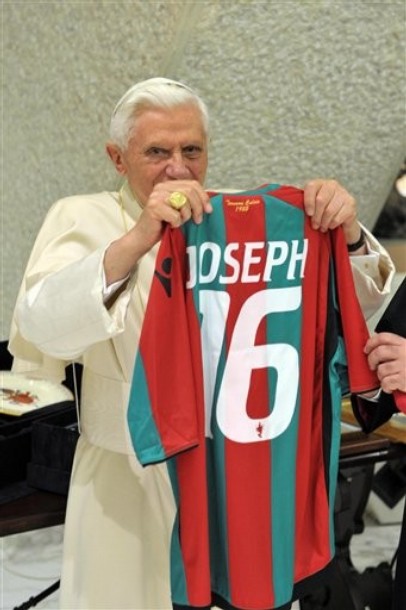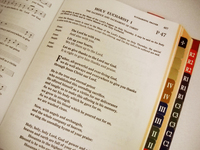Father Benedict Groeschel hosted Ken Hacket, the president of the Catholic Relief Services (CRS) on his weekly EWTN program, Sunday Night Live a few weeks ago. Since 1972 he's worked in the missions. The program was a source of hope for me because it expanded my horizons of what we as Christians are meant to be: beacons of hope and compassion for others, not only in a time of need, but at all times. This organization clearly and proudly represents us doing good around the world. CRS is a great example of Christian charity!
March 2011 Archives
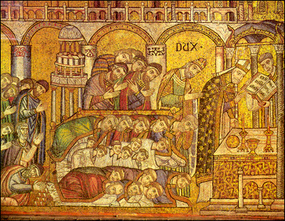 Père [Cardinal] Yves Congar, OP, in 1963 quoted by Geoffrey Hull in The Banished Heart (2010):
Père [Cardinal] Yves Congar, OP, in 1963 quoted by Geoffrey Hull in The Banished Heart (2010): We can't live in abstractions. Reality as it is, God in Himself, is revealed in the concrete. The temptation is to let ourselves be consumed by what is non-essential, with things that burdensome or just plainly a pain. God is not known in the abstract; God is only revealed in the concreteness of life: in love, goodness, beautiful things, friendship, prayer, the sacred Liturgy, the proclamation of the Word, the sacred Tradition of the Church, and the like. Lent for some people is an abstract time of the Church's calendar because they don't necessarily know the aim, the goal, the necessity and the personal. What we all should bear in mind is that Lent is a simple time for getting back to basics so that these basics become virtue and virtue becomes a permanent way of looking at things in front of us. A little girl who does religious education following the method of the Catechesis of the Good Shepherd (CGS) focusses our attention in how she experiences this period of conversion. "What is Lent? Lent is a time of reflection, of preparing ourselves for the resurrection of Our Lord... by doing something that takes a great effort... a time of sharing and giving ourselves, body and soul to God and the Holy Spirit" (Jessica, 9 years old, Chihuahua Mexico, Journals of the Catechesis of the Good Shepherd, 1984 - 1997, p.149).
Jessica's rather simple declaration hopefully gives you pause during the day to give heart and the mind the space to do something other than work. Lent, like Advent, is a fitting to time of the liturgical year to reflect on the meaning of the Cross and the our Lord's resurrection (this is what we call the Paschal Mystery). In what concrete ways does God the Father, God the Son and God the Holy Spirit capture our imagination --our heart? The founder of the CGS movement Sofia Cavalletti writes: "Simplicity also imposes a kind of asceticism, but it is an asceticism that is joyful, happy, dynamic, and opens out to spaces that are always becoming wider. It is an asceticism that is invigorating, filling the lungs with fresh air that empowers us to keep climbing toward the summit, where the space we will stand on might have become smaller, but the space before us, the panorama we view, will have opened out on the infinite" ("Holy Simplicity," Journals of the Catechesis of the Good Shepherd, 2003 - 2008, p. 4).
A few times in the last month I've mentioned the the tragic death of a brother in the Lord, Shahbaz Bhatti, a Catholic in Pakistan, a voice against oppression. His death should signal for us that religious freedom is not operative around the world as well as out-and-out persecution of Christians is a too frequent occurrence. Just read the end of the year stats on the deaths of people just because they are Christian published by the Vatican office of Evangelization of Peoples. We can't under-estimate the our brothers and sisters in other parts of the world face just because they utter Jesus' name as Lord and Savior: they face death and oppression daily.
In a recently published essay, "The Assassination of Shahbaz Bhatti, Jesuit Father Luciano Larivera, explores the details of a Christian's murder by Islamic extremists. He writes in his summary, "On March 2, a commando of an Islamic terrorist group assassinated Shahbaz Bhatti, 42, the minister of Religious Minorities in Pakistan. He was a Catholic, and is already considered a martyr for the faith and interreligious dialogue. Let us quote the spiritual testament. As with the governor of the province of the Punjab, Salmaan Taseer, who was killed Jan. 4, Bhatti had fought for the abolition, or at least for the reform, of the law against blasphemy and the liberation of Asia Bibi, who was sentenced to be hung for insulting Muhammad. Pakistan is torn apart by numerous tensions and an internal power struggle. Religious violence and intimidation have weakened the Government's action. The country needs the restoration of an effective criminal justice system, which also prevents and sanctions crimes against religious minorities. La Civiltà Cattolica (3859, 2011, II, pp. 81-90) carries the essay.
The UK's Guardian carried this obit for Shahbaz Bhatti.
- look for ways to grow in virtue by practice and asking for the grace from Jesus;
- reduce time sitting in front of the TV, vedging-out; drinking, and eating bad food;
- be aware of the ways in which self-ish behavior is the norm and make changes;
- spend time doing lectio divina, praying the rosary and praying for enemies one's conversion;
- seek ways to be generous, self-sacrificing by offer a sincere gift of self, self mastery relationship with the Lord.
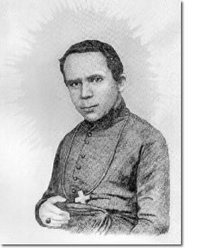
His love for
people was authentic brotherly love. It was real charity: missionary and
pastoral charity. It meant that he gave himself to others. Like Jesus the Good
Shepherd, he lay down his life for the sheep, for Christ's flock: to provide
for their needs, to lead them to salvation. And today, with the Evangelist, we
solemnly proclaim: "There is no greater love than this: to lay down one's life
for one's friends" (John 15, 13).
excerpt, canonization homily
19 June 1977
Learn more about Saint John Neumann during this holy year, the 200th anniversary of his birth.
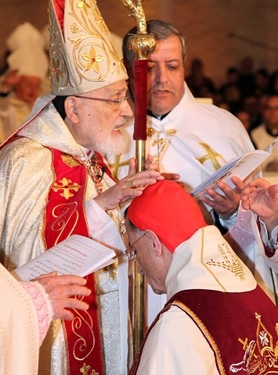
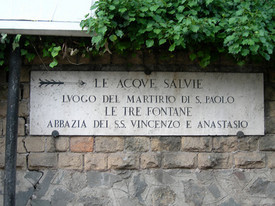
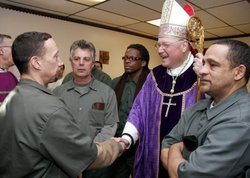 "all of us are sinners. We need mercy and healing that only Jesus can give," Archbishop Timothy M. Dolan told prisoners today at the Arthur Kill correctional facility on Staten Island, NY. The Archbishop offered the Sacrifice of the Mass for about 75 prisoners and others. The story is here.
"all of us are sinners. We need mercy and healing that only Jesus can give," Archbishop Timothy M. Dolan told prisoners today at the Arthur Kill correctional facility on Staten Island, NY. The Archbishop offered the Sacrifice of the Mass for about 75 prisoners and others. The story is here.

 Today the Church --though localized to the Cistercian Order-- celebrates the liturgical memorial of Saint Stephen Harding, one of the 3 founders of the Cistercian reform of Benedictine monastic life. Most of the faithful would not know of Saint Stephen unless they had contact with the Cistercians or remember their church history class.
Today the Church --though localized to the Cistercian Order-- celebrates the liturgical memorial of Saint Stephen Harding, one of the 3 founders of the Cistercian reform of Benedictine monastic life. Most of the faithful would not know of Saint Stephen unless they had contact with the Cistercians or remember their church history class.
A striking line in Gerard Manley Hopkins' poem "The Leaden Echo and the Golden Echo," "Give beauty back, beauty, beauty, beauty, back to God, beauty's self and beauty's giver." English Jesuit priest Gerard Manley Hopkins (1844-1889) was renowned for his use of Blessed John Duns Scotus' theology and his creative use of language and rhythm (notice Hopkins' characteristic stresses on certain words).
The Leaden Echo and the Golden Echo(Maiden's song from St. Winefred's Well)
The Leaden Echo
How to kéep--is there ány any, is there none such, nowhere known some, bow orbrooch or braid or brace, láce, latch or catch or key to keep
Back beauty, keep it, beauty, beauty, beauty, ... from vanishing away?
Ó is there no frowning of these wrinkles, rankéd wrinkles deep,
Dówn? no waving off of these most mournful messengers, still
messengers, sad and stealing messengers of grey?
No there 's none, there 's none, O no there 's none,
Nor can you long be, what you now are, called fair,
Do what you may do, what, do what you may,
And wisdom is early to despair:
Be beginning; since, no, nothing can be done
To keep at bay
Age and age's evils, hoar hair,
Ruck and wrinkle, drooping, dying, death's worst, winding sheets, tombs and worms and
tumbling to decay;
So be beginning, be beginning to despair.
O there 's none; no no no there 's none:
Be beginning to despair, to despair,
Despair, despair, despair, despair.
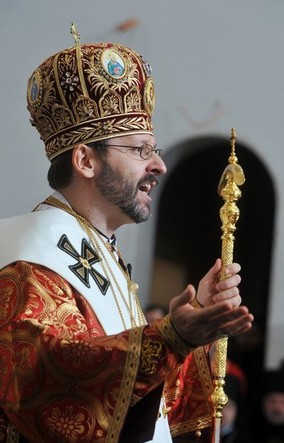
His Beatitude, Archbishop Sviatoslav's first homily as head of the Ukrainian Greek Catholic Church is noted below. It is a very good homily focusing on the Cross and our acceptance of that life-giving Cross today. We have no other option as Christians. Pay close attention to what the new archbishop says: live, witness, strive for holiness, move closer to Christ today.
Beloved in Christ, brothers and sisters!
Glory to Jesus Christ!
"We praise your Cross, Lord, and glorify Your holy resurrection!"
With these words today, the Church of Christ focuses on the Honest and True Cross. Today, as we pass the halfway point of our Lenten journey, the Life-Giving Tree is given to us, that we might find in it a source of strength and courage to go on to the Resurrection, to put the Sign of the Cross at the center of our lives.
In his Epistle to the Philippians, St Paul has left us a unique early Christian hymn that a young Church, newly enlivened by the Holy Spirit, solemnly sang in its Liturgy.
The Apostle calls to us this way:
Have among yourselves the same attitude that is also yours in Christ Jesus, Who, though he was in the form of God, did not regard equality with God, something to be grasped. Rather, he emptied himself, taking the form of a slave, coming in human likeness; and found human in appearance, he humbled himself, becoming obedient to death, even death on a cross. Because of this, God greatly exalted him and bestowed on him the name that is above every name, that at the name of Jesus every knee should bend, of those in heaven and on earth and under the earth, and every tongue confess that Jesus Christ is Lord, to the glory of God the Father (2:6-11).
 Cardinal Gianfranco Ravasi's interview on the importance of the Court of the Gentiles for us. This is probably the single most significant initiative of the Pontifical Council for Culture taking seriously the place of belief and unbelief. The Pope some time ago asked the pastors of the Church to take atheism as a serious matter to engage in. And by atheism he's not suggesting the Christopher Hitchens' version of atheism but what might be called "honest atheism," those who ask sincere questions of belief and who are seeking to live a coherent life. The Pope is brilliant in his call to respect, dialogue and living.
Cardinal Gianfranco Ravasi's interview on the importance of the Court of the Gentiles for us. This is probably the single most significant initiative of the Pontifical Council for Culture taking seriously the place of belief and unbelief. The Pope some time ago asked the pastors of the Church to take atheism as a serious matter to engage in. And by atheism he's not suggesting the Christopher Hitchens' version of atheism but what might be called "honest atheism," those who ask sincere questions of belief and who are seeking to live a coherent life. The Pope is brilliant in his call to respect, dialogue and living.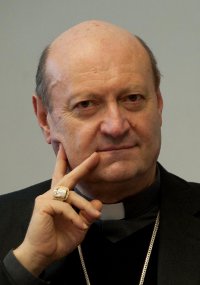 I know that at the invitation of Cardinal André Vingt-Trois, the Archbishop of Paris, and of Cardinal Gianfranco Ravasi (seen right), the President of the Pontifical Council for Culture, you are gathered in great numbers in front of the Cathedral of Notre Dame in Paris. I greet all of you, together with our brothers and friends from the Taizé Community. I am grateful to the Pontifical Council for having taken up and extended my invitation to open a number of "Courts of the Gentiles" within the Church. This image refers to the vast open space near the Temple of Jerusalem where all those who did not share the faith of Israel could approach the Temple and ask questions about religion. There they could meet the scribes, speak of faith and even pray to the unknown God. The Court was then an area of separation, since Gentiles did not have the right to enter the consecrated area, yet Jesus Christ came to "break down the dividing wall" between Jews and Gentiles, and to "reconcile both to God in one body through the cross, thus putting to death that hostility in himself". In the words of Saint Paul, "He came and proclaimed peace..." (cf. Eph 2:14-17).
I know that at the invitation of Cardinal André Vingt-Trois, the Archbishop of Paris, and of Cardinal Gianfranco Ravasi (seen right), the President of the Pontifical Council for Culture, you are gathered in great numbers in front of the Cathedral of Notre Dame in Paris. I greet all of you, together with our brothers and friends from the Taizé Community. I am grateful to the Pontifical Council for having taken up and extended my invitation to open a number of "Courts of the Gentiles" within the Church. This image refers to the vast open space near the Temple of Jerusalem where all those who did not share the faith of Israel could approach the Temple and ask questions about religion. There they could meet the scribes, speak of faith and even pray to the unknown God. The Court was then an area of separation, since Gentiles did not have the right to enter the consecrated area, yet Jesus Christ came to "break down the dividing wall" between Jews and Gentiles, and to "reconcile both to God in one body through the cross, thus putting to death that hostility in himself". In the words of Saint Paul, "He came and proclaimed peace..." (cf. Eph 2:14-17).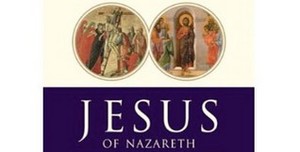 Pope Benedict's book, Jesus of Nazareth, volume 2, internationally released on March 10 with 1.2 million copies in 8 languages.
Pope Benedict's book, Jesus of Nazareth, volume 2, internationally released on March 10 with 1.2 million copies in 8 languages.Some people are suggesting that the Catholic bishops of Pakistan may petition the Pope to say that the recently murdered Shahbaz Bhatti is a martyr. More will be known on or after the March 25th meeting of the bishops. Bhatti was gunned down on Marc in Islamabad. Pakistan has about 2.5 Christians.
Bishop Andrew Francis of Multan: "Bhatti is a man who gave his life for his crystalline faith in Jesus Christ. It is up to us, the bishops, to tell his story and experience to the church in Rome, to call for official recognition of his martyrdom."
Archbishop Lawrence Saldanha of Lahore and president of the
Conference of Bishops said: "The murder of Shahbaz Bhatti means that we
have lost a great leader of our community who stood up for us and articulated
the concerns and fears of our people. We do not have a leader now. Our people
are quite down. They are fearful of the future."
In the meantime, Paul Bhatti, MD, has been appointed by Pakistan's Prime Minister to work with minorities, the same job his brother had.
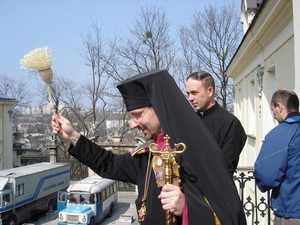 The Ukrainian Greek Catholic Church is facing new challenges in the coming years and the Church's Synod of Bishops (the Sobor) has decided to meet the challenge head-on: the Synod elected and the Pope confirmed communion with, a 40 year bishop Sviatoslav Shevchuk, a man who's been bishop for less than 2 years and a moral theologian.
The Ukrainian Greek Catholic Church is facing new challenges in the coming years and the Church's Synod of Bishops (the Sobor) has decided to meet the challenge head-on: the Synod elected and the Pope confirmed communion with, a 40 year bishop Sviatoslav Shevchuk, a man who's been bishop for less than 2 years and a moral theologian.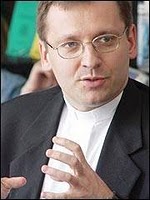
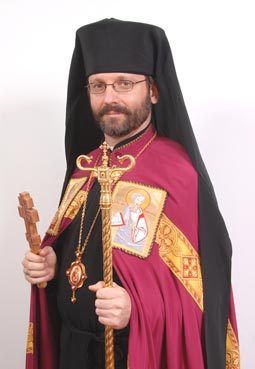
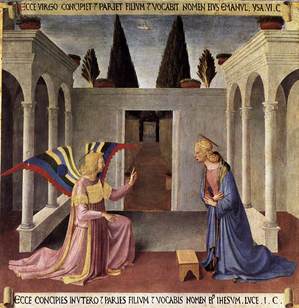
What happened here in Nazareth, far from the gaze of the world, was a singular act of God, a powerful intervention in history, through which a child was conceived who was to bring salvation to the whole world. The wonder of the Incarnation continues to challenge us to open up our understanding to the limitless possibilities of God's transforming power, of his love for us, his desire to be united with us. Here the eternally begotten Son of God became man, and so made it possible for us, his brothers and sisters, to share in his divine sonship. That downward movement of self-emptying love made possible the upward movement of exaltation in which we too are raised to share in the life of God himself (cf. Phil 2:6-11).
The Spirit who "came upon Mary" (cf. Lk 1:35) is the same Spirit who hovered over the waters at the dawn of Creation (cf. Gen 1:2). We are reminded that the Incarnation was a new creative act. When our Lord Jesus Christ was conceived in Mary's virginal womb through the power of the Holy Spirit, God united himself with our created humanity, entering into a permanent new relationship with us and ushering in a new Creation. The narrative of the Annunciation illustrates God's extraordinary courtesy (cf. Mother Julian of Norwich, Revelations 77-79). He does not impose himself, he does not simply pre-determine the part that Mary will play in his plan for our salvation: he first seeks her consent. In the original Creation there was clearly no question of God seeking the consent of his creatures, but in this new Creation he does so. Mary stands in the place of all humanity. She speaks for us all when she responds to the angel's invitation. Saint Bernard describes how the whole court of heaven was waiting with eager anticipation for her word of consent that consummated the nuptial union between God and humanity. The attention of all the choirs of angels was riveted on this spot, where a dialogue took place that would launch a new and definitive chapter in world history. Mary said, "Let it be done to me according to your word." And the Word of God became flesh.
When we reflect on this joyful mystery, it gives us hope, the sure hope that God will continue to reach into our history, to act with creative power so as to achieve goals which by human reckoning seem impossible. It challenges us to open ourselves to the transforming action of the Creator Spirit who makes us new, makes us one with him, and fills us with his life. It invites us, with exquisite courtesy, to consent to his dwelling within us, to welcome the Word of God into our hearts, enabling us to respond to him in love and to reach out in love towards one another.
Pope Benedict XVI14 May 2009
Basilica of the Annunciation, Israel
As a way of deepening the Mystery of the Incarnation, here is "Beyond the Clash of Absolutes: Abortion" taken from Carl A. Anderson's 2010 book, Beyond A House Divided.
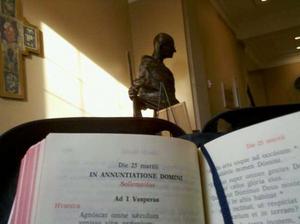
Lenten observances are varied: you can fast, pray the Way of the Cross, do charitable acts, give alms, spend time in contemplative prayer before the Blessed Sacrament, do lectio divina, pray the rosary, and the like. The possibilities are limitless. You might know, Catholics have a lot in their own mystical tradition to deepen a relationship with the Blessed Trinity. And some real good stuff, too. So much so, that a Catholic doesn't have to stray far from orthodox Christianity for prayer.
Doubtful, however, is the spending any kind of energy on "Gandhi, Peace and Nonviolence" an acceptable alternative for Catholics. Especially when knowledge of the Catholic tradition is relatively low, even among theology students. But that is what the Boston College School of Theology and Ministry's Lenten focus was today. The idea is OK. Wait. It was pretty mediocre. Why not reflect upon peace and nonviolence using music and select readings? At a Catholic school of theology and ministry where students are paying tuition in order to be trained to be better Catholics, superb lay Catholic leaders and teachers, and perhaps even priests, Gandhi just doesn't fit during Lent.
I wonder if anyone at a Jesuit school of theology and ministry ever thought of focusing on one of the great spiritual fathers and mothers of the Church --Augustine, Ephrem, Aquinas, Bonaventure, Lawrence of Brindisi, Hilary of Poiters, Loyola, Gertrude, Tauler, Marguerite d'Oingt, Catherine of Siena, Giussani, Lubich, Benedict XVI-- for Lenten prayer and readings? Then, I have to wonder if Gandhi is BC's type of Catholic and the list above are too obscure for mainline believers. Are these people too Catholic? Perhaps Gandhi is the new patron saint of the liberal-blue hairs and they haven't told the rest of the Church yet? Curious to know what Sister Quinn was thinking.
This is not only a question of Catholic identity at a supposed Catholic institution of higher education, but a question of formation for the proclamation of the Kingdom of God. It is a question of helping each other know their destiny in Jesus Christ.
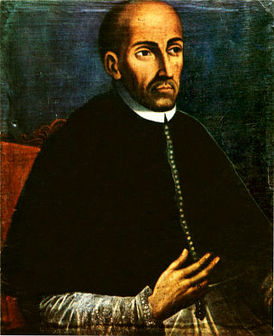

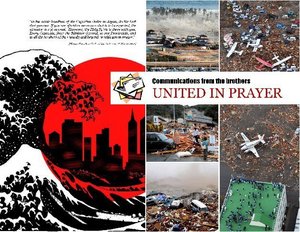
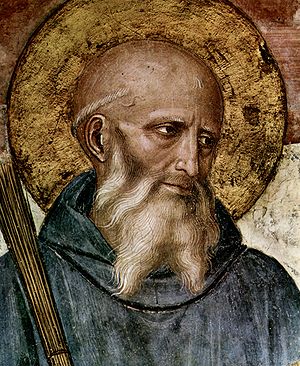
Image via Wikipedia
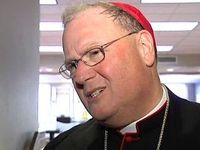 60 Minutes aired Morely Safer's interview with Archbishop Timothy M. Dolan tonight. Watch Safer on Dolan.
60 Minutes aired Morely Safer's interview with Archbishop Timothy M. Dolan tonight. Watch Safer on Dolan.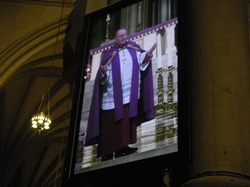 Earlier this afternoon at St Patrick's Cathedral, hundreds of people gathered to formally state their intention to receive their sacraments of initiation at the Easter Vigil. The Church of Saint Catherine of Siena has three men intending to receive the Sacrament of Confirmation. We joined 67 other parishes in the Archdiocese of New York for the "Rite of Calling the Candidates to Continuing Conversion."
Earlier this afternoon at St Patrick's Cathedral, hundreds of people gathered to formally state their intention to receive their sacraments of initiation at the Easter Vigil. The Church of Saint Catherine of Siena has three men intending to receive the Sacrament of Confirmation. We joined 67 other parishes in the Archdiocese of New York for the "Rite of Calling the Candidates to Continuing Conversion."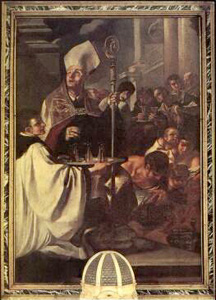 Blessed John of Parma (1209-1289) was born at Parma. He studied and taught philosophy and known to be a devoted man to the Lord. Sensing the Lord's call to serve Him more intensely, John entered the newly founded Friars Minor, the group that followed Saint Francis of Assisi. Completing his theological studies John was ordained priest and taught theology at Bologna, Naples and eventually in Rome. Father John was sent to the Council of Lyons in 1245.
Blessed John of Parma (1209-1289) was born at Parma. He studied and taught philosophy and known to be a devoted man to the Lord. Sensing the Lord's call to serve Him more intensely, John entered the newly founded Friars Minor, the group that followed Saint Francis of Assisi. Completing his theological studies John was ordained priest and taught theology at Bologna, Naples and eventually in Rome. Father John was sent to the Council of Lyons in 1245.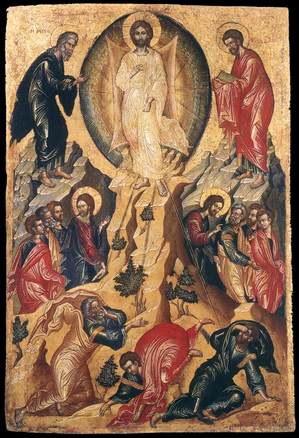 Thou wast transfigured on the mountain, O Christ, our
God, showing to Thy disciples Thy glory as each one could endure. Shine forth
Thou on us, who are sinners all, Thy light ever-unending. Through the prayers
of the Theotokos, Light-Bestower, glory to Thee.
Thou wast transfigured on the mountain, O Christ, our
God, showing to Thy disciples Thy glory as each one could endure. Shine forth
Thou on us, who are sinners all, Thy light ever-unending. Through the prayers
of the Theotokos, Light-Bestower, glory to Thee.
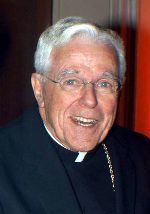
Archbishop Claudio Maria Celli, president of the Pontifical Council for Social Communications, has urged Catholics to evangelize the "digital culture." He made his remarks on March 18. A common theme spoken of in recent weeks from various Vatican officials, including Pope Benedict. Celli's office has been working overtime in recent weeks in tackling media in its various forms. And one must remember that it has taken aliong time to get where we are today, thanks in part to the good work of many laity, lower clergy and a Franciscan Sister of the Eucahrist Sister Judith Zoebelein. The Vatican has been on the web since 1995.
Archbishop Celle told L'Osservatore Romano in a March 17 interview that after Easter, the Holy See will launch a new news website that will gather all the Vatican media services into one portal in English, French and Italian with the hope to offer its media services in additional languages.
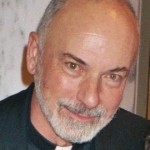 The sad news of Fr Corapi being placed on administrative leave is making the rounds. His own testimony of the facts is noted here.
The sad news of Fr Corapi being placed on administrative leave is making the rounds. His own testimony of the facts is noted here.Raymond Cardinal Burke, Prefect of the Supreme Tribunal of the Apostolic Signature, has been traveling lately. Most recently to Australia. There he spoke on the theme of "The Fall of the Christian West," at a symposium organized by the Australian Catholic Students Association, Sydney. He gave "particular attention to the witness to the truth regarding human sexuality, as fundamental to holiness of life, and to the question of conscience as the irreplaceable and secure guide in the pursuit of holiness of life." The cardinal also reflected on martyrdom.
Among many things said in the address the Cardinal said:
- quoting Benedict XVI said, we "need to form our consciences, in accord with the moral teaching of the Church ... 'our responsibility to make these criteria [these moral foundations] audible and intelligible once more for people today as paths of true humanity, in the context of our paramount concern for mankind'"
- "...our call to build anew a strong Catholic culture, in fidelity to our vocation to give witness to Christ and, therefore, to be martyrs for the faith"
- "witness to the truth regarding human sexuality, as fundamental to holiness of life, and to the question of conscience as the irreplaceable and secure guide in the pursuit of holiness of life."
- "The life of the martyr for the faith finds its center and source in the Eucharistic sacrifice, in Eucharistic adoration, and in all forms of Eucharistic devotion, especially visits to the Blessed Sacrament and spiritual communion throughout the day"
- "The Holy Eucharist not only strengthens us spiritually to be true martyrs, but is the model of our martyrdom, pure and selfless love, without condition, to the end."
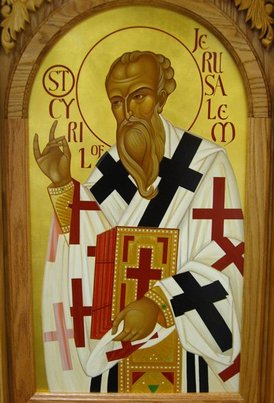
The Benedictine news service provided the following news piece on the recent problems in Japan. We should pray to the Japanese martyrs for their assistance before the Throne of Grace:
Father Don
Talafous OSB, in one of his Daily Reflections, speaks about how
difficult it is to comprehend the enormity of the multiple disasters that have
befallen the people of Japan. Communications are still sparse from the
afflicted Diocese of Sendai, with 11,000 Catholics, that
includes the areas hardest-hit in the disaster. Several monks of Trinity Benedictine
Monastery, Fujimi, Japan, shared reports with the monks of Saint John's
Abbey, the founding community. The
reports mention little damage at Fujimi, some disruption at the
Trappistine monastery, Nasu, Tochigi Prefecture, and the death of a
Redemptorist priest whose car was swept away.
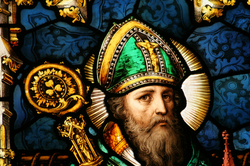
The Office of Readings for the feast of Saint Patrick offers a different reading than what is below. In fact, I would urge you to read the Office of Readings for Saint Patrick just so you get to know the real person versus the fiction one hears on his feast, at least around these parts. I am thinking of what it means to live in the awareness of having spiritual patrernity (or spiritual maternity if you are a woman reading this post). We often do not hear much of spiritual fatherhood these days; it is not in vogue in many mainline Catholic centers, unfortunately. But when one considers the fact that we all, because we are baptised into Christ's death and resurrection, and that we have been given the gifts of mercy, Confirmation and Eucharist, we witness to the Good News of Salvation. By our clear testimony we shepherd others who do not know Christ to know Him. Our very words and actions betry our belief in Christ. The homily of Saint Asterius of Amasea exhorts us to be like Christ the Good Shepherd. Are we up for the challenge on this feast of Saint Patrick? In what ways is your heart like Jesus' heart? Will you pray for the grace to be a spiritual father or mother to those who need your testimony?
You were made in the image of God. If then you wish to resemble him, follow his example. Since the very name you bear as Christians is a profession of love for men, imitate the love of Christ.
Reflect for a moment on the wealth of his kindness. Before he came as a man to be among men, he sent John the Baptist to preach repentance and lead men to practice it. John himself was preceded by the prophets, who were to teach the people to repent, to return to God and to amend their lives. Then Christ came himself, and with his own lips cried out: Come to me, all you who labour and are overburdened, and I will give you rest. How did he receive those who listened to his call? He readily forgave them their sins; he freed them instantly from all that troubled them. The Word made them holy; the Spirit set his seal on them. The old Adam was buried in the waters of baptism; the new man was reborn to the vigor of grace.
What was the result? Those who had been God's enemies became his friends, those estranged from him became his sons, those who did not know him came to worship and love him.
Let us then be shepherds like the Lord. We must meditate on the Gospel, and as we see in this mirror the example of zeal and loving kindness, we should become thoroughly schooled in these virtues.
For there, obscurely, in the form of a parable, we see a shepherd who had a hundred sheep. When one of them was separated from the flock and lost its way, that shepherd did not remain with the sheep who kept together at pasture. No, he went off to look for the stray. He crossed many valleys and thickets, he climbed great and towering mountains, he spent much time and labour in wandering through solitary places until at last he found his sheep.
When he found it, he did not chastise it; he did not use rough blows to drive it back, but gently placed it on his own shoulders and carried it back to the flock. He took greater joy in this one sheep, lost and found, than in all the others.
Let us look more closely at the hidden meaning of this parable. The sheep is more than a sheep, the shepherd more than a shepherd. They are examples enshrining holy truths. They teach us that we should not look on men as lost or beyond hope; we should not abandon them when they are in danger or be slow to come to their help. When they turn away from the right path and wander, we must lead them back, and rejoice at their return, welcoming them back into the company of those who lead good and holy lives.
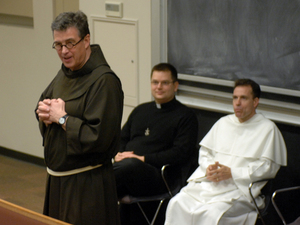 Last week at the University of Notre Dame (my alma mater) members of the various religious orders along with a secular priest, spoke about their place in the Church. In church lingo: they spoke about their charism (the diivne gift). As you know ND was founded and continues to be sponsored by the Congregation of Holy Cross (CSC) but through the years members of religious orders like the Franciscans, Jesuits and Dominicans (among others) have worked and/or studied at ND. The richness ot the women religious ought to be explored at some point.
Last week at the University of Notre Dame (my alma mater) members of the various religious orders along with a secular priest, spoke about their place in the Church. In church lingo: they spoke about their charism (the diivne gift). As you know ND was founded and continues to be sponsored by the Congregation of Holy Cross (CSC) but through the years members of religious orders like the Franciscans, Jesuits and Dominicans (among others) have worked and/or studied at ND. The richness ot the women religious ought to be explored at some point. 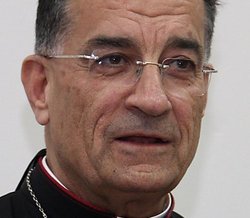 Only 20 years junior to the out-going patriarch, His Beatitude Nasrallah Peter Sfeir, the Maronite bishops elected today Bishop Béshara Raï, 71, as the new patriarch. He's 77th patriarch of the Maronites; Raï takes up the See of St Peter (Peter's first diocese before moving to Rome), adopting the name Peter. He will be known as "His Beatitude, Patriarch Béshara Peter Raï."
Only 20 years junior to the out-going patriarch, His Beatitude Nasrallah Peter Sfeir, the Maronite bishops elected today Bishop Béshara Raï, 71, as the new patriarch. He's 77th patriarch of the Maronites; Raï takes up the See of St Peter (Peter's first diocese before moving to Rome), adopting the name Peter. He will be known as "His Beatitude, Patriarch Béshara Peter Raï." One of the NY "news" rags that I periodically glance at (no pun intended) told me that a study at the University of Bristol (UK) determined that chickens are people. I didn't know that. Did you? Here's the story:
One of the NY "news" rags that I periodically glance at (no pun intended) told me that a study at the University of Bristol (UK) determined that chickens are people. I didn't know that. Did you? Here's the story:Chickens have feelings, according to British veterinarians. The researchers took a group of mother hens and their chicks and blew puffs of air at the chicks. This caused the birds distress and sent their heart rates up, reducing the temperature of their eyeballs --a well-known sign of stress. The mother hens showed exactly the same signs of stress when they were hit with puffs of air, too ...
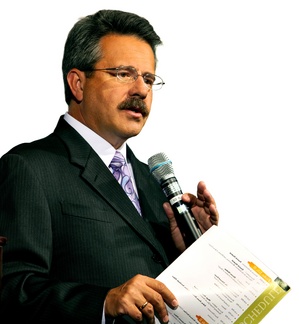 The Siena Forum for Faith and Culture will be hosting Patrick Madrid -of EWTN fame-- at the Church of Saint Catherine of Siena (NYC) this
coming weekend!
The Siena Forum for Faith and Culture will be hosting Patrick Madrid -of EWTN fame-- at the Church of Saint Catherine of Siena (NYC) this
coming weekend!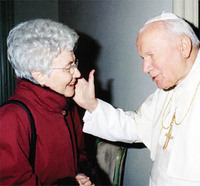
 I always look for evidence --that is, I am looking for light on a situation that may not be very clear for me-- i.e., for the reality, the truth and beauty of a vigorous Catholic life by seeing if people are willing to live the Gospel. We do our best given the graces we've received and our own open hearts. I find myself in need to know that others belief that that the promises (and extraordinary claims) of Christ are true and are lived. Novel, right? Not really. We Catholics have been concerned for the welfare of others since the time Jesus and because our Christianity has its roots in Judaism, even before Jesus. Just read the Old Testament and dig into the narrative there. But it is Jesus gives a new lens by which to see life and to live differently today by the fact of the Paschal Mystery (His life, death, resurrection and ascension).
I always look for evidence --that is, I am looking for light on a situation that may not be very clear for me-- i.e., for the reality, the truth and beauty of a vigorous Catholic life by seeing if people are willing to live the Gospel. We do our best given the graces we've received and our own open hearts. I find myself in need to know that others belief that that the promises (and extraordinary claims) of Christ are true and are lived. Novel, right? Not really. We Catholics have been concerned for the welfare of others since the time Jesus and because our Christianity has its roots in Judaism, even before Jesus. Just read the Old Testament and dig into the narrative there. But it is Jesus gives a new lens by which to see life and to live differently today by the fact of the Paschal Mystery (His life, death, resurrection and ascension). Headline Bistro is collecting testimony on the ways in which Pope John Paul II has been influential in our lives. The so-called "JPII Generation" is a powerfully impacted by the life, ministry and teaching of this giant of Catholicism.
Headline Bistro is collecting testimony on the ways in which Pope John Paul II has been influential in our lives. The so-called "JPII Generation" is a powerfully impacted by the life, ministry and teaching of this giant of Catholicism.Is not this the fast that I choose: to loose the bonds of wickedness, to undo the thongs of the yoke, to let the oppressed go free, and to break every yoke? Is it not to share your bread with the hungry, and bring the homeless poor into your house; when you see the naked, to cover him, and not to hide yourself from your own flesh? Then shall your light break forth like the dawn, and your healing shall spring up speedily; your righteousness shall go before you, the glory of the Lord shall be your rear guard.
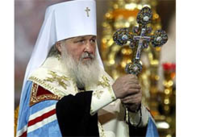 Swiss Cardinal Kurt Koch will be going to Moscow this weekend to meet Patriarch Kyril and Russian Orthodox Church leaders.
Swiss Cardinal Kurt Koch will be going to Moscow this weekend to meet Patriarch Kyril and Russian Orthodox Church leaders.A few days ago I recommended seeing "Of Gods and Men." Last week I saw the film and I have still been thinking of the movie, the monks, the hard work of inter-religious dialog. The testament of Dom Christian de Cherge can be read here. I highly recommend reading what Prior Christian said and what others think. A group of friends took time to see the movie together. Two friends brought a perspective of the film to my attention recently. The following is an an answer to those who ask whether a desire for God is still present in our times. Angelo Scola writes:
I believe that the worldwide success of the film on the Tibhirine monks [U.S. Title: "Of Gods and Men"] reflects a burning desire in the men and women of any latitude to meet the face of God; it therefore reflects the real need we all feel for authentic witnesses who may help us keep our gazes focused upwards.
Authentic witness is, in fact, not limited to "giving a good example". It shines in all its wholeness as a method for practically knowing reality and communicating truth. It is a primary value, standing above any other form of knowledge and communication - scientific, philosophical, theological, artistic, etc.
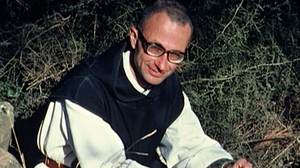
A luminous example of this method is offered by the very words which Fr Christian de Chergé, prior of the Trappist monastery of Notre-Dame de l'Atlas in Tibhirine, Algeria, wrote in his spiritual will [noted above], a good three years before he was massacred with his monks:
"When the time comes, I would like to be able to have an instant of lucidity that would allow me to ask for the pardon of God and that of men, my brothers, while forgiving with all my heart those who may have hit me... I cannot see how I could, in fact, rejoice in that this people I love could be accused of my assassination. It
 Earlier today I had the space of time to begin my lenten observance by thinking about healing and forgiveness. Without these two legs of the spiritual life personal renewal won't happen. A talk was hosted by the Franciscan Life Center in Meriden, Connecticut, a ministry of the Franciscan Sisters of the Eucharist. The executive director of the FLC Sister Barbara Johnson, FSE, made the presentation to about 75 people.
Earlier today I had the space of time to begin my lenten observance by thinking about healing and forgiveness. Without these two legs of the spiritual life personal renewal won't happen. A talk was hosted by the Franciscan Life Center in Meriden, Connecticut, a ministry of the Franciscan Sisters of the Eucharist. The executive director of the FLC Sister Barbara Johnson, FSE, made the presentation to about 75 people.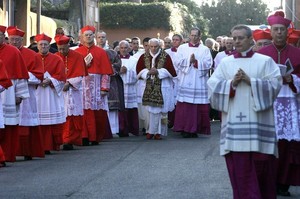
At the ancient Roman Basilica of Santa Sabina known today as the mother church of the Order of Preachers, the Pope began Lent with the reception of ashes. The imposition of ashes is not ritualistic sign without meaning: we put ashes on our heads not in contradiction of the Gospel chosen for that day but as a way to remind ourselves that an outward sign conveys an inward reality. He first began the Lenten prayer at the Benedictine Church of Sant'Anselmo (just down the street from Santa Sabina). There he gathered with the monks, priests, bishops , cardinals and laity for a visit to the Blessed Sacrament, brief service of prayer and a procession to Santa Sabina where Holy Mass was celebrated. Yes, the pope walks the streets of Rome, but in a limited way. It is a gesture full of beauty. This is ancient way for the Roman Pontiff to lead the Church into a season of penance and preparation for the sacred Triduum. The Holy Father's homily is below.
We begin today the liturgical season of Lent with the thought-provoking rite of the imposition of ashes, through which we wish to take on the commitment to convert our hearts to the horizons of grace. In general, in common opinion, this time runs the risk of being marked by sadness, by the darkness of life. Instead, it is a precious gift of God; it is an intense time full of meanings in the journey of the Church; it is the itinerary to the Lord's Easter. The biblical readings of today's celebration give us indications to live this spiritual experience fully.

Yesterday's Scripture reading at Mass from Tobit was a great entry into the great season of Lent: blinded for four years, Tobit's whole life changed. His lent, as it were, provided him the graced-filled opportunity to make some necessary changes in his relationship with God and other, not mention he softened his demeanor. In time, God heals his physical and spiritual blindness. If you get a chance, read the Book of Tobit. One has to ask, to what am I blinded to and how do I want God to heal me.
In his audience today the Pope recalled for us that "The Fathers of the Church teach that these three pious exercises are closely related: indeed, Saint Augustine calls fasting and almsgiving the "wings of prayer," since they prepare our hearts to take flight and seek the things of heaven, where Christ has prepared a place for us."
For those who believe in Christ and follow his path, the "Christian life is a 'road' to be travelled, it consists not so much of a law to be observed, but in meeting, welcoming and following Christ". We meet the Lord Jesus "in the light and joy of the resurrection, the victory of life, love and good, then we too have to take up the cross of everyday life."
Lent begins today, "let us accept Christ's invitation to follow him more closely, renew our commitment to conversion and prayer, and look forward to celebrating the Resurrection in joy and newness of life."
At the end of the lenten 40 days, how do I want to be different from who I am today? In what concrete ways will I allow prayer, fasting and almsgiving to be tools for my own education in the faith as Christ proposes to me? Will I have a renewed understanding of the Cross and the Resurrection of Jesus Christ that totally changes my life?
- Catholics between the ages of 18 and 59 who are in good health are bound by the obligation to fast on Ash Wednesday and Good Friday.
- Catholics between the ages of 14 and older must abstain from meat on Ash Wednesday, Good Friday and all Fridays of Lent.
 The other day there was some press, most of it inane, about the revised edition of the New American Bible.
The other day there was some press, most of it inane, about the revised edition of the New American Bible.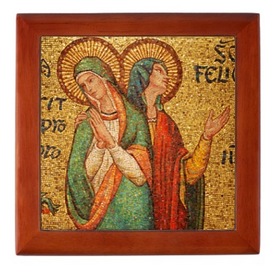
Today's first reading and Gospel ask the question: how, in fact, are we grounded in the Lord? Have I allowed Christ to enter into my life sufficiently and without reservation? Am I aware that Christ takes the initiative in calling me to a deeper conversion and that I have to respond?
Pope Benedict's message for the 2011 World Youth Day participants draws this line of thinking out:
"We ... want to be able to see Jesus, to speak with him and to feel his presence even more powerfully. For many people today, it has become difficult to approach Jesus. There are so many images of Jesus in circulation which, while claiming to be scientific, detract from his greatness and the uniqueness of his person. That is why, after many years of study and reflection, I thought of sharing something of my own personal encounter with Jesus by writing a book. It was a way to help others see, hear and touch the Lord in whom God came to us in order to make himself known. Jesus himself, when he appeared again to his disciples a week later, said to Thomas: "Put your finger here and see my hands. Reach out your hand and put it in my side. Do not doubt but believe" (Jn 20:27). We too can have tangible contact with Jesus and put our hand, so to speak, upon the signs of his Passion, the signs of his love. It is in the sacraments that he draws particularly near to us and gives himself to us. Dear young people, learn to "see" and to "meet" Jesus in the Eucharist, where he is present and close to us, and even becomes food for our journey. In the sacrament of Penance the Lord reveals his mercy and always grants us his forgiveness. Recognize and serve Jesus in the poor, the sick, and in our brothers and sisters who are in difficulty and in need of help."
Lent begins with Ash Wednesday on March 9. What is on your list of Bona Opera, your good works? Chapter 49 of the Rule of Saint Benedict speaks of the monk (here, all people) keeping Lent in front of our eyes all the time. He urges us, therefore, to do good, to keep purity in our hearts and minds by refraining from evil. Saint Benedict exhorts us to restrain ourselves from sinful habits and to devote time to prayer of the heart, fasting, lectio divina, compunction, ascetism, and charitable work.
How are you going to build your spiritual life on solid ground? In what ways are you going to be a spiritual father and mother to another? Will you pray, fast and give alms to the good works of the Church uniting your intentions with the Sacred Heart of Jesus for sake of poor, needy, the Church, the Pope, sinful people and priests, etc? Will you study the Word of God and spend time in prayer before the Blessed Sacrament?
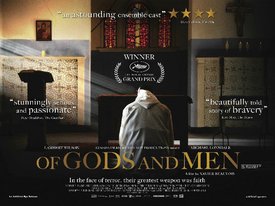 Xavier Beauvois' new film "Of Gods and Men" (Des Hommes et des Dieux) is an intense and moving film of 7 Trappist monks in Algeria who had a coexistence with Muslim neighbors until extremists threatened and killed the monks. The Atlas Martyrs gave their lives in the night of 27-28 March 1996.
Xavier Beauvois' new film "Of Gods and Men" (Des Hommes et des Dieux) is an intense and moving film of 7 Trappist monks in Algeria who had a coexistence with Muslim neighbors until extremists threatened and killed the monks. The Atlas Martyrs gave their lives in the night of 27-28 March 1996.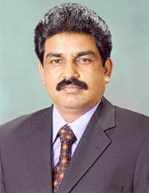
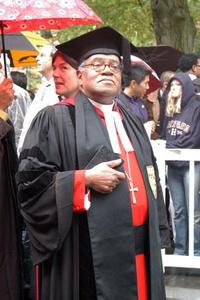 The very colorful minister, the Reverend Peter J. Gomes, who served at Harvard for more than 40 years, died last evening. Reverend Gomes oversaw the ministries of Memorial Church and delivered a rousing Easter sermon each year. He was an accomplished and stimulating writer, teacher and preacher.
The very colorful minister, the Reverend Peter J. Gomes, who served at Harvard for more than 40 years, died last evening. Reverend Gomes oversaw the ministries of Memorial Church and delivered a rousing Easter sermon each year. He was an accomplished and stimulating writer, teacher and preacher. 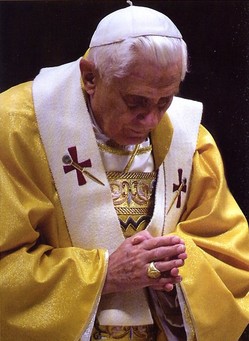 The Pope reminds us to broaden our awareness of other Christians in the world. Here we remember those Christians in Latin America and persecuted Christians. The second intention is most poignant given recent acts of violence on the many of the Eastern Churches.
The Pope reminds us to broaden our awareness of other Christians in the world. Here we remember those Christians in Latin America and persecuted Christians. The second intention is most poignant given recent acts of violence on the many of the Eastern Churches.
